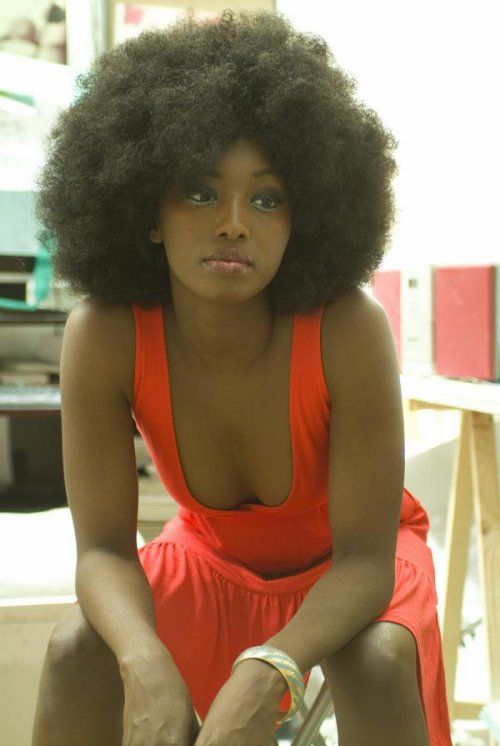I grew up with my cousins, six of us. Like most Swahili families, we were various shades of skin tones and hair types. Our hair varied from straight Arab hair, to thick curls with everything else in between. Mine was what most would at the time consider as “regular African” hair; just a bit softer with a looser curl pattern. But compared to my cousins’ it was kinky. So, while my hair was always in cornrows theirs was in pony tails and ribbons. We used to go to the salon together and every time, there were questions about my hair. Why wasn’t it curly enough like the rest? Wasn’t I a real Swahili? I eventually stopped going to the same salon as them. When I was in high school I finally relaxed my hair like most girls who had my type of hair. 3 years ago, I decided to stop relaxing and transitioned into natural hair. Throughout the time I had relaxed my hair, the comments never stopped. It was either too thin, not long enough, too hard, or not Swahili enough. One of my favorites was when non-Swahili people commented on how sure they were that my hair was awesome under my hijab and how they wished that they had hair like mine.
My decision to go back to my natural hair was informed in part by social media, having seen the natural hair movement by African-American women where they reclaimed the meaning of beautiful hair. The other reason was that I wanted to do this thing that was unheard of in my community for my type of hair; to keep it as it grew. I also wanted to prove that it could grow long, even though its texture and type was not the kind associated with long hair. But eventually, I got over that and I have learned to love and enjoy it as it is. Right now I’m at the point where if I wanted to cut it, I wouldn’t think twice about it. It’s just hair, it’ll grow back. Not that I don’t care, it’s just that it doesn’t define who I am anymore.
A few weeks ago a Kenyan man tweeted that African women are using the “natural hair movement” as an excuse to keep untidy and unkempt hair as long as “we’ve put a flower or ribbon on it”. He also said that natural hair works for only some people. It was pretty clear he was trolling. It has become common for men on Twitter to say controversial things to get the attention of women, especially feminists, so that they can use the reaction they get to reinforce their sexism. If they get a backlash, they will then backtrack and say “the feminists are coming for me” to show that feminists are unreasonable and cannot handle criticism. This is a silencing tactic, because they know eventually women will stop engaging with them and they can continue being sexist without any recourse. I am very aware of this. And most of the time, I ignore such trolls. However on this day I chose to respond. But I did not engage him directly but instead posted pictures of my hair using the hashtag #MyUnkemptHair. Other Kenyan women joined in and before long our TLs were filled with natural hair in all types and textures and lengths and it was a glorious lovefest.
I chose to respond for two reasons. The debate on African women’s hair is a long and complicated one. In a world where women are expected to perform beauty for the male gaze, and where hair is considered a marker of beauty, a lot of women consider hair to be a part of their identity. And in a world where whiteness informs the standards of beauty, there are specific types of hair that are considered beautiful depending on their proximity to whiteness. Therefore, in the global scale of beauty, black women’s hair is at the bottom. Disdain and demonization of African hair in its natural state has been pushed by a media machine which elevated straight hair of white women or hair close to it(Asian, Arab). In Kenya and most African countries the shift to straightening hair happened sometimes during the 70s and 80s when women started applying curly kits and relaxers into their hair. Hot combs and blow drying was also used for temporary straightening. For most of us, cornrows were for school going children and grown women had straight and sleek hair. And in the last 15 years weaves became common. This is what you call assimilation where members of an oppressed group takes on norms of a dominant culture so as to fit in and avoid dehumanization because of being different.
In the last couple of years, more African women have started wearing their hair natural. In the beginning there was a backlash that natural hair was unprofessional, as it didn’t look “attractive” and even though this has improved, this notion still persists in certain sectors. In 2015, I have heard cases of African women, in corporate spaces still missing out on career opportunities because of wearing their hair as it grows. In addition, there are hierarchies in which types of natural hair is acceptable. Looser hair, with big curls is preferred where kinkier, tight curled hair is still frowned upon.
continue reading
photo: Essence
I am a content creator, social media agency owner, former attorney and publicist, wife and mom. I love working in cafes, wine, food and music festivals, Sunday brunch, home decorating, travel and life.
